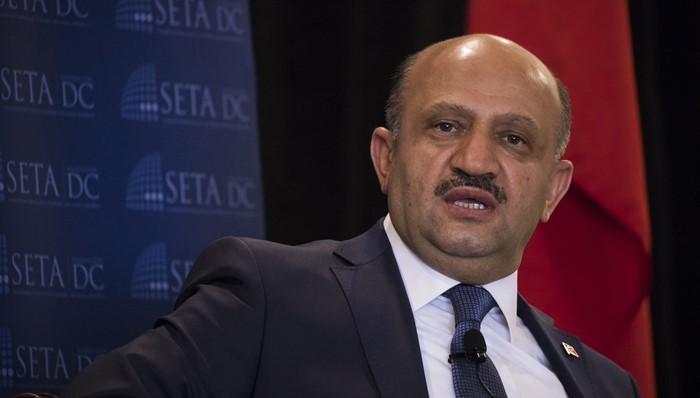Amid the debate over purges in the Turkish military, Defense Minister Fikri Işık has said 5,300 more military school cadets will be enrolled in 2017, the t24 news website reported on Saturday.
Speaking during a ceremony at the Selah Shipyard in İstanbul, he said they have received four times more applications for military schools than the average of the last four years.
The government has been at the center of criticism for turning the Turkish Armed Forces (TSK) into a political Islamist military in line with the wishes of President Recep Tayyip Erdoğan.
In February, Defense Minister Işık said 30,000 new recruits would be enlisted in the TSK.
A month later Işık declared that the ruling Justice and Development Party (AKP) government had dismissed a total of 22,920 military personnel (6,511 officers and 16,409 cadets) after a coup attempt on July 15 although the Turkish military stated on July 27 that only 8,651 military members including cadets and conscripts took part in the failed coup.
The Cumhuriyet daily reported in March that the government plans to investigate 90,000 more military personnel over links to the Gülen movement.
“If it was a coup perpetrated by the Gülen movement and 22,920 military personnel were dismissed for their connections to the movement as Erdoğan and the government assert, why did only 8,651 military members participate in the coup?” is a question being asked by critics.
Regulations that task retired officers and noncommissioned officers with recruiting cadets and military personnel went into effect in January amid debates that it was a gift to SADAT A.S. International Defense Consulting, which has also been called President Recep Tayyip Erdoğan’s “secret army.”
SADAT was directed by retired Brig. Gen. Adnan Tanrıverdi, who was appointed as an adviser to President Erdoğan. Tanrıverdi is known for his Islamist ideology and has counseled Erdoğan for years although in an unofficial capacity, columnist Abdullah Bozkurt wrote for Turkish Minute on Nov. 25.
In June, an imam-hatip, or religious high school, in İzmir province promised its graduates preference in enrollment at military and police academies.
Some find the Turkish government’s efforts to Islamicize the Turkish army alarming and warn that NATO risks having a member army filled with extremists.
“What we are witnessing now is a new generation [being raised] within the army, and which has Islamist views. … NATO will have, in two or four years, a member army full of extremists and Salafists,” said a former senior officer from the Turkish Armed Forces who served at SHAPE and NATO headquarters in Belgium and who was purged after the attempted coup, in an interview with Vocal Europe in June.
The military coup attempt on July 15 killed over 240 people and wounded more than a thousand others. Immediately after the putsch, the AKP government along with President Erdoğan pinned the blame on the Gülen movement.
Fethullah Gülen, who inspired the movement, strongly denied having any role in the failed coup and called for an international investigation into it, but President Erdoğan — calling the coup attempt “a gift from God” — and the government initiated a widespread purge aimed at cleansing sympathizers of the movement from within state institutions, dehumanizing its popular figures and putting them in custody.
Contrary to accusations made by President Erdoğan and the Turkish government, the Foreign Affairs Committee of the UK Parliament concluded in March that Gülen and the movement he inspired as a whole were not behind the failed coup in Turkey.
The UK Parliament statement came a week after Germany rejected Erdoğan and the Turkish government’s accusations against the Gülen movement about July 15.
The head of Germany’s Federal Intelligence Service (BND), Bruno Kahl, said Turkey could not convince them that US-based Turkish-Islamic scholar Gülen was behind the failed coup in July.
Similarly, Devin Nunes, chairman of United States House Permanent Select Committee on Intelligence, said he has not seen any evidence showing Gülen’s involvement in the putsch in Turkey.
In addition, a report prepared by the EU Intelligence Analysis Centre (IntCen) revealed that the coup attempt was staged by a range of Erdoğan’s opponents due to fears of an impending purge.
In February, Henri Barkey, director of the Middle East Program at the Washington-based Wilson Center, said that many generals purged by the Turkish government are pro-NATO and pro-American, saying this could create a shift in Turkey-NATO relations.


